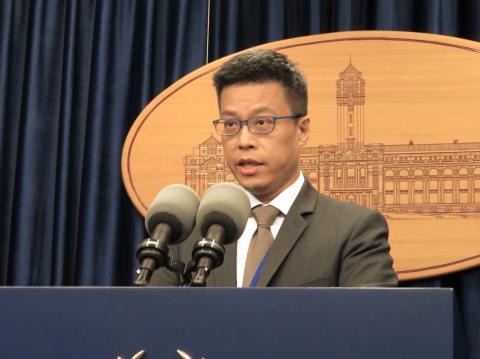The government yesterday said that it would not bow to Chinese pressure and called for the support of the international community against China’s “out-of-control actions” after Beijing urged Apple, Amazon.com and other foreign companies to change the way they refer to Taiwan.
“As for China’s related out-of-control actions, we need to remind the international community to face this squarely and to unite efforts to reduce and contain such actions,” Presidential Office spokesman Alex Huang (黃重諺) told reporters in Taipei.
“Brutal behaviors” such as forcing the “one country, two systems” model on Taiwan, using politics to affect other nations’ economies or threatening foreign enterprises to alter references to Taiwan are all efforts by Beijing to interfere in the domestic affairs of other nations, he said.

Photo: Li Hsin-fang, Taipei Times
Such actions not only risk destabilizing the international community, but could also cause the world to lose faith in and respect for China, and constitute a “blatant disruption” to the positive development of cross-strait relations, he added.
Taiwan is undoubtedly closely linked to the international community, Huang said, adding that changing its name online would not erase it from the world.
Huang’s remarks came after one of China’s top government-linked think tanks, the Chinese Academy of Social Sciences, said in a report earlier this month that 66 of the world’s 500 largest companies have used “incorrect labels” for Taiwan.
According to the Chinese state-run Legal Daily, the academy’s report, which was cowritten with Peking University’s Internet Development Research Institution, said that 53 companies also referred to Hong Kong “erroneously” and 45 referred to both “incorrectly.”
An official at the institute told Reuters that the report had not yet been published and declined to provide a copy.
China has stepped up its pressure on Taiwan since President Tsai Ing-wen (蔡英文), of the pro-independence Democratic Progressive Party, took office in 2016.
That has included rising Chinese scrutiny in the past few months over how companies from airlines, such as Air Canada, to retailers, such as Gap, refer to the nation.
Nike, Siemens, ABB, Subaru and other companies were also on the list.
Apple, Amazon, ABB, Siemens, Subaru and Nike did not immediately respond to requests for comment by Reuters.
The Ministry of Foreign Affairs yesterday also condemned China’s action in a news release, saying that the move demonstrated Beijing’s “evil intent” to downgrade the nation’s sovereignty.
The ministry reiterated that Taiwan is an independent, sovereign nation, a fact that would not be changed by China’s actions, saying that such acts of bullying would only further “widen the rift between the two sides of the Taiwan Strait.”
It also called on the international community to join Taipei in opposing Chinese bullying.

DAREDEVIL: Honnold said it had always been a dream of his to climb Taipei 101, while a Netflix producer said the skyscraper was ‘a real icon of this country’ US climber Alex Honnold yesterday took on Taiwan’s tallest building, becoming the first person to scale Taipei 101 without a rope, harness or safety net. Hundreds of spectators gathered at the base of the 101-story skyscraper to watch Honnold, 40, embark on his daredevil feat, which was also broadcast live on Netflix. Dressed in a red T-shirt and yellow custom-made climbing shoes, Honnold swiftly moved up the southeast face of the glass and steel building. At one point, he stepped onto a platform midway up to wave down at fans and onlookers who were taking photos. People watching from inside

A Vietnamese migrant worker yesterday won NT$12 million (US$379,627) on a Lunar New Year scratch card in Kaohsiung as part of Taiwan Lottery Co’s (台灣彩券) “NT$12 Million Grand Fortune” (1200萬大吉利) game. The man was the first top-prize winner of the new game launched on Jan. 6 to mark the Lunar New Year. Three Vietnamese migrant workers visited a Taiwan Lottery shop on Xinyue Street in Kaohsiung’s Gangshan District (崗山), a store representative said. The player bought multiple tickets and, after winning nothing, held the final lottery ticket in one hand and rubbed the store’s statue of the Maitreya Buddha’s belly with the other,

Japan’s strategic alliance with the US would collapse if Tokyo were to turn away from a conflict in Taiwan, Japanese Prime Minister Sanae Takaichi said yesterday, but distanced herself from previous comments that suggested a possible military response in such an event. Takaichi expressed her latest views on a nationally broadcast TV program late on Monday, where an opposition party leader criticized her for igniting tensions with China with the earlier remarks. Ties between Japan and China have sunk to the worst level in years after Takaichi said in November that a hypothetical Chinese attack on Taiwan could bring about a Japanese

‘COMMITTED TO DETERRENCE’: Washington would stand by its allies, but it can only help as much as countries help themselves, Raymond Greene said The US is committed to deterrence in the first island chain, but it should not bear the burden alone, as “freedom is not free,” American Institute in Taiwan Director Raymond Greene said in a speech at the Institute for National Defense and Security Research’s “Strengthening Resilience: Defense as the Engine of Development” seminar in Taipei yesterday. In the speech, titled “Investing Together and a Secure and Prosperous Future,” Greene highlighted the contributions of US President Donald Trump’s administration to Taiwan’s defense efforts, including the establishment of supply chains for drones and autonomous systems, offers of security assistance and the expansion of